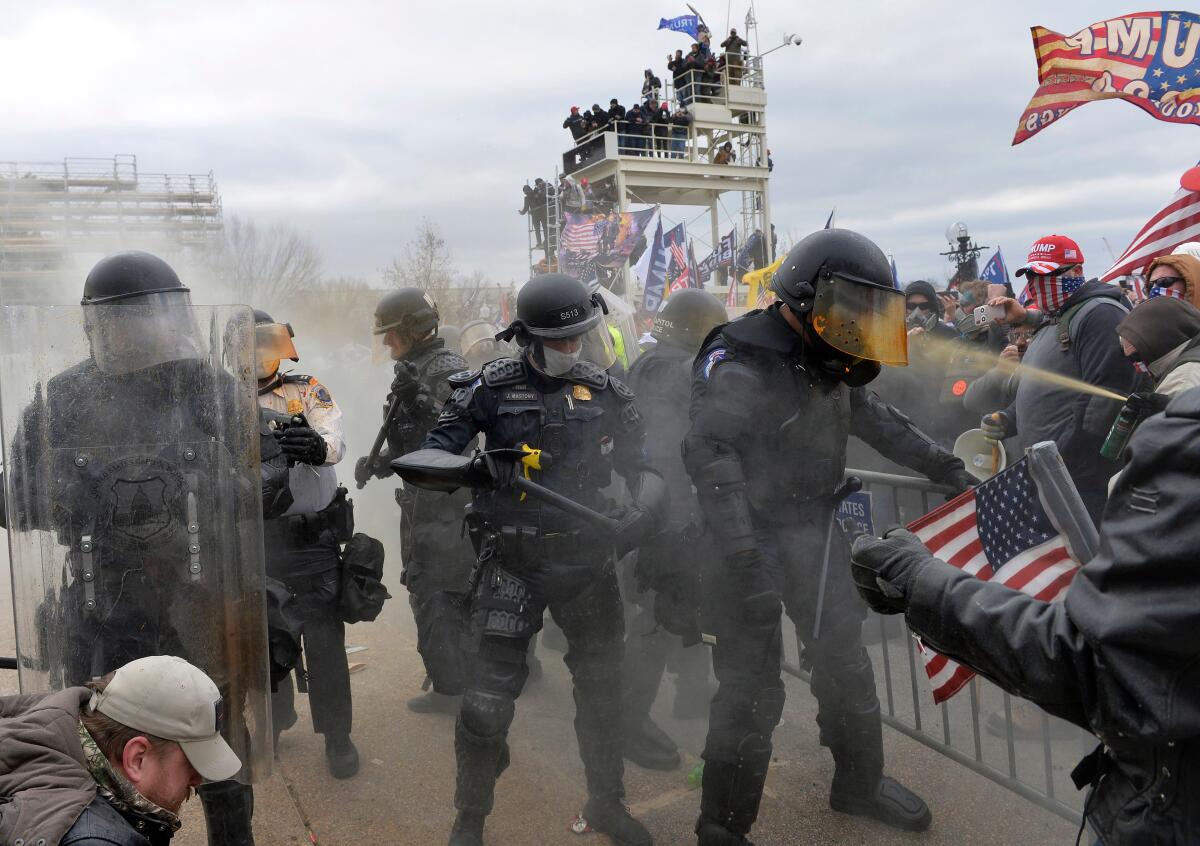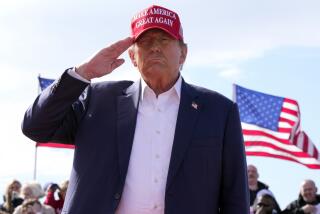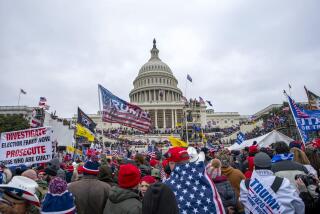Op-Ed: What it will take to fight the threat of violent right-wing militias

Federal prosecutors are moving forward with scores of cases against people in the pro-Trump mob that stormed the U.S. Capitol on Jan. 6 to stop Congress from certifying the electoral college vote for Joe Biden.
Videos of the siege — which left five people dead — have allowed investigators to identify and arrest more than 100 of these insurrectionists. Much still needs to be discovered about those who organized and carried out the attack. In the coming months, Congress and the Biden administration will be facing hard questions about the adequacy of the U.S. response to the growing domestic extremist threat.
Putting aside whether there are gaps in U.S. terrorism laws that should be filled, the assault on the Capitol vividly exposed the need to enforce rarely used existing laws (and consider whether more are needed) to address the extremist threat from private militias. Numerous individuals criminally charged in the violent attack are alleged members of paramilitary organizations. The first set of conspiracy charges has been brought against three members of the Oath Keepers, a right-wing militia group that often recruits from law enforcement and the military because of their training in paramilitary tactics and the use of firearms.
Evidence is mounting that private militias played a significant role in planning and organizing the attack, using social media and other platforms. This role is consistent with what we’ve seen from these groups in the last year alone.
Since the onset of the pandemic, paramilitary groups have engaged in armed intimidation and threats at statehouses, governors’ mansions, and public health officials’ homes in opposition to public health orders. They have endangered public safety — with fatal results — by self-deploying to “protect” property from what have been largely false rumors of antifa violence during racial justice demonstrations. Six men involved with a private militia have been charged with plotting to kidnap Michigan Gov. Gretchen Whitmer and try her for treason. These groups are trained and organized for the sort of violence that occurred on Jan. 6. Support for Trump has often been at the core of their online rhetoric, and Trump’s apparent encouragement of their activities has been used to normalize their extremist views for broader appeal.
The Capitol siege reveals something that many have been willing to ignore for too long: the involvement of paramilitary organizations that often refer to themselves as “patriots” with extremists who openly advocate for and commit violent attacks to intimidate and coerce. Many condemn the latter as domestic terrorists, and indeed, the U.S. Code defines domestic terrorism as activities that involve crimes of violence committed with the intent “to intimidate and coerce a civilian population” or “to influence the policy of a government by intimidation or coercion.” But few have been willing to acknowledge that some paramilitary organizations and their members have advocated for and committed acts that meet the domestic terrorism definition.
Private militia organizations routinely urge their members to acquire semi-automatic assault rifles and military gear. They hold trainings in armed urban assault, building infiltration, using incendiary devices, and other paramilitary activity. They openly view themselves as responsible for taking up arms against anything they view as government tyranny. They are a danger to public safety and our democracy.
Although private militias often point to the 2nd Amendment for their authority, that provision provides them no support. The Supreme Court made this clear in 1886 when it upheld a criminal prosecution for violating an Illinois anti-militia statute. That state law, which barred individuals from associating together as a military unit or company, or parading or drilling in public with firearms, remains on the books of 29 states to this day. Indeed, all 50 states prohibit private militias by the terms of their state constitutions and/or statutes, including the kind of statute upheld by the Supreme Court in 1886. But these laws are rarely enforced.
One reason could be that local prosecutors, police and sheriffs, who are accustomed to enforcing laws against more common street crimes, are unfamiliar with the anti-militia laws in their state. They might be uncertain about what type of evidence would be needed to prove a case.
But another likely reason is that local law enforcement officials are usually elected, and in jurisdictions where the local community is largely supportive of both Trump and private militias — often rural communities where strong anti-government and pro-gun-rights views predominate — there’s little incentive, and a lot of disincentive, to use the tools they have available. And so unlawful private militias persist, sometimes even with the open support of local law enforcement.
If local law enforcement officials fail to act, the threat must be addressed through other means. State attorneys general who have the authority to prosecute criminal cases should step in and bring the cases that local law enforcement agencies fail to bring. Where their state laws do not give them general criminal enforcement authority, the law should be changed. State attorneys general also should explore their civil enforcement options, including through public nuisance laws that exist to protect public health and welfare.
Federal prosecutors should go after private militias using existing federal criminal laws that prohibit the use of firearms, incendiary devices, or paramilitary techniques, or traveling interstate with firearms or incendiary devices, intending to use them in a civil disorder. Those who facilitate or fund such activity should be investigated, too.
And Congress should consider enacting a federal offense — like the state equivalent upheld by the Supreme Court in 1886 — prohibiting unauthorized private militias. The senators and House members who were minutes from being assaulted and abducted at the Capitol should now understand the danger that private militias present.
Mary B. McCord is legal director of Georgetown Law’s Institute for Constitutional Advocacy and Protection, a former acting assistant attorney general for national security at the Department of Justice, and a longtime federal prosecutor.
More to Read
A cure for the common opinion
Get thought-provoking perspectives with our weekly newsletter.
You may occasionally receive promotional content from the Los Angeles Times.






